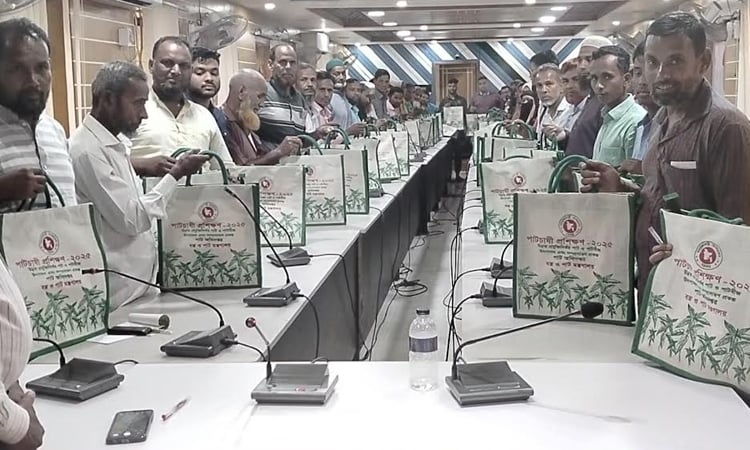News Flash
News Flash

THAKURGAON, May 31, 2025 (BSS) - Once the backbone of Bangladesh's economy, jute - the golden fibre - is witnessing a promising resurgence in Thakurgaon.
From the brink of disappearance, overshadowed by plastic and neglect, jute is now making a striking return across Thakurgaon's farmlands.
Since mid-April, a new season of promise has begun, as farmers return to their fields as some are tending the crops, while others ensuring proper irrigation and many simply watching their fields thrive with renewed hope.
Under the Department of Jute's initiative titled "Production and Expansion of High-Yield Jute and Jute Seeds Through Advanced Technology", local farmers have received free high-yield seeds (BJRI-8/ROBI-1), fertilizers, and hands-on training.
This year, the target is to cultivate jute on 3,500 acres of land across four upazilas, aiming for a production of around 140 metric tons.
"We're working to spark new enthusiasm among farmers," said Dilip Kumar Malakar, Thakurgaon's Jute Development Officer.
"Through the use of modern technologies and training, we can increase yields and make jute cultivation profitable again," he added.
Abdul Kuddus, a farmer from Pirganj upazila of the district, said, "After many years, I've started growing jute again. The government has provided seeds, fertilizer, and training. Now, I hope for a good harvest. If the market price holds steady, jute farming will thrive again."
Echoing him standing beside, his wife Hasina Begum said, "It's been years since we've seen so many jute plants in the fields. It feels like the golden days might be coming back. Even the women in our village were invited to training, and we really enjoyed it."
On May 14, a training workshop titled "Jute Farmers' Training Program 2025" was held at Thakurgaon Sadar Upazila Parishad Hall, attended by 75 male and female farmers from nearby villages. The training - led by agriculture and jute development officials - continued across the district till today.
Shyamoli Rani, a female farmer from Sadar upazila, said, "Previously, only the men worked in the land. Now we, women, are also involved in jute farming. The training taught us how to get better yields at lower costs."
Kamal Uddin, Assistant Project Director (attached) at the Department of Jute in Dhaka, joined the session virtually to monitor and advise farmers. He responded to concerns in real time and assured regular follow-up in the future.
Environmentalists highlight the return to jute as a significant move toward sustainability. With the ban on polythene, jute is being recognized not just for its economic value, but also as the most viable eco-friendly substitute.
Shamima Nazneen, Training Officer at the Department of Agricultural Extension, said, "This project not only helps farmers financially but also promotes environmentally sustainable agriculture."
At the end of the training, each participant was gifted a bag made from jute, promoting awareness and encouraging the public to use jute-based products in daily life.
In Thakurgaon, the once-declining jute industry is finding its feet again. Smiling farmers, verdant fields, and strategic government initiatives are together echoing the return of the country's golden legacy - beckoning once more the days of the Golden Fibre, they added.